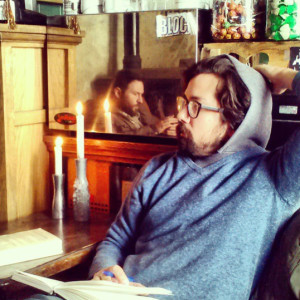SHIRAKAMI
A stone resembles
A woman in white
Paused in a circle of heat
Is a man
Looking into the mirror, the mirror of stone
Could see the man as a woman
In white touching
The man
Some mirrors unpolished
Once reflective but aged into
Stills
Their reflections
In the old days, when the sea covered
The land
White paper was placed
On the reef
Paper and God, Kami—Shirakami
Meaning a white god worshipped
Woman and man
By the shape of their heads
Not perfect until they realize
They are praying
To whom? To what
Absolutely resembles?
KEYAKI (4)
A man
Flirting
Above
His hunger
Is
His
Shadow
Beneath
Heaven’s contract with
Earth
As a sentry
Or invisible
Passenger
Fossil mammal
Frozen
Blind
Night parting
From the side
Of the heart where
The verse is
Maybe
I am
A girl
After all
The girls
Is what I
Said, I mean that
That is
What
I told them
(written at night in Japan, 2011-2012)
Shirakami Shrine is at the intersection of Peace Boulevard and Rijo-dori in Hiroshima City. Shira is white, kami are divine spirits and, depending on the character, paper. Peace and Rijo-dori was once a reef projecting into the bay. White paper decorated the reef to warn incoming ships. Brandon, in Teutonic, means, from the beacon hill. I often shorten that to mean,beacon. In August 2011, I visited, with the poet Dot Devota, Hiroshima. It was the first time I visited since the 1980s. On the sidewalk outside Shirakami, a young man, a photographer, stopped a young woman to ask if he could take her picture. The young woman’s face was strikingly white; she had painted her skin with white make-up. Where was she going? Was she an actress? Her face was a mask. Was she a reef-spirit? She quietly obliged. The young man took her picture. We spent a week in Hiroshima. We slept on futons in the apartments of two young men we’d met online. Each night before sleep, I wrote poems in a tiny notebook I bought in Tainan, Taiwan the month before. We were in Japan for a month. I wrote 100 poems. Was the woman a ghost? We were in Japan visiting places relevant to my grandparents’ and great-grandparents’ lives. My grandfather was a photographer, though it was the woman with whom I identified. What was she hiding? Even still, she shared her face with the man.
 Brandon Shimoda is the author of four books, including Portuguese (Octopus Books & Tin House) and O Bon (Litmus Press). The poems appearing here are from a collection written in Death Valley and Japan, with the working title, Evening Oracle. All of the above include cameos by food and old women. Born in California, Brandon has lived most recently in Arizona, Taiwan, and Missouri. See also: related poems in recent installments of BOMBlog and diode.
Brandon Shimoda is the author of four books, including Portuguese (Octopus Books & Tin House) and O Bon (Litmus Press). The poems appearing here are from a collection written in Death Valley and Japan, with the working title, Evening Oracle. All of the above include cameos by food and old women. Born in California, Brandon has lived most recently in Arizona, Taiwan, and Missouri. See also: related poems in recent installments of BOMBlog and diode.